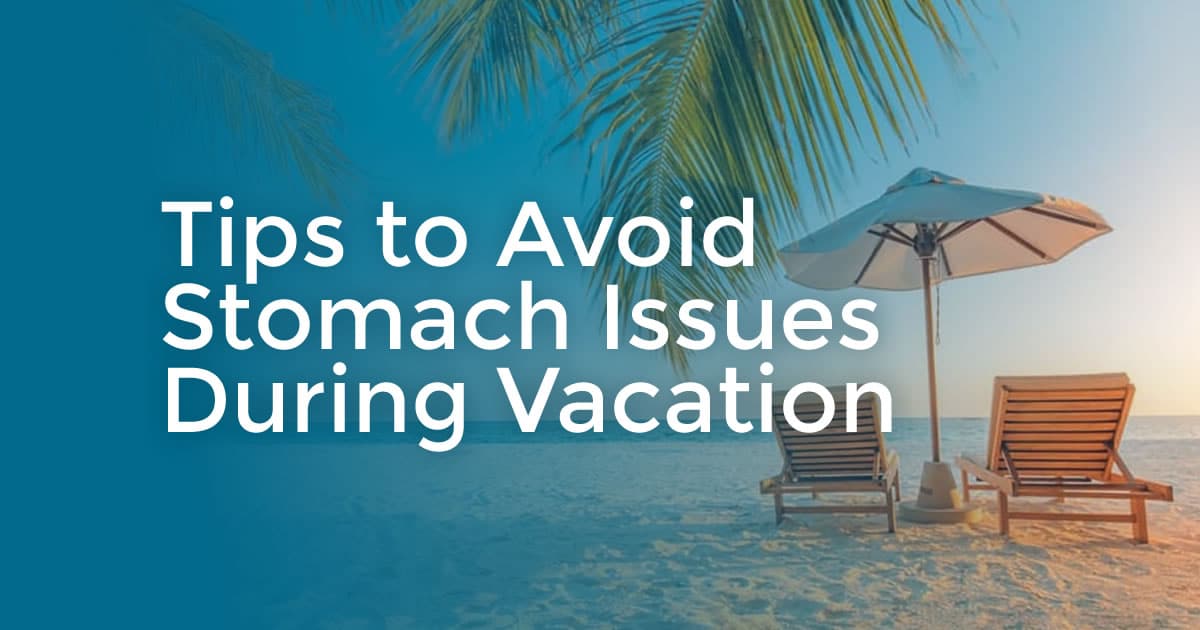Have you ever felt bloated, constipated, or nauseous when traveling? If so, it’s something you don’t want to repeat!
Vacations should be about exploring your destination, trying local foods, and spending time with friends and family — not your stomach issues.
Sometimes, all the changes that come with traveling can create a perfect storm that disrupts your digestion. This article will discuss how you can avoid unwanted stomach issues on your next trip.
Causes of Stomach Issues
Experiencing uncomfortable symptoms on vacation can have many potential causes. We’ve made a list of the most common causes of stomach issues below.
Overindulging on Food
Traveling often involves eating out at local restaurants. This can mean eating more sugar, caffeine, and greasy foods than usual, which can disrupt the composition of bacteria in your gut. This can lead to stomach issues like bloating, constipation, and diarrhea. Eating large quantities of food can also anger your stomach and cause heartburn.
Not Drinking Enough Fluids
Exploring your destination is often the number one thing on your vacation to-do list. But don’t forget to stay hydrated! Not drinking enough fluids can slow down digestion and cause the formation of hard, painful stools.
Stress of Traveling
Adjusting to a new schedule when traveling can be stressful for your body. You may be eating at different times, going to bed later, and sleeping less. All of these factors can throw off your normal digestive schedule and lead to stomach issues.
5 Tips to Avoid Stomach Issues
Keep reading to discover 5 tips to avoid stomach issues when traveling.
1. Stay Hydrated
Your digestive system needs water to function properly. Water helps break down food, absorb essential nutrients, and move waste through your system.
Staying hydrated can normalize stool consistency and increase the frequency and weight of bowel movements. This can reduce your risk of constipation when traveling.
Interestingly, drinking water may also lower your risk of colon cancer. This is because increased fluid consumption speeds up the movement of waste through your digestive tract and limits your exposure to carcinogens. While this isn’t necessarily a travel-specific tip, it’s important to acknowledge the benefits of staying hydrated in your daily life!
2. Eat Foods Rich in Fiber
Eating fruits, vegetables, and whole grains rich in fiber can also improve your digestion and soothe stomach issues. A fiber-rich diet can prevent both constipation and diarrhea by:
- Normalizing stool form
- Bulking up stool
- Increasing the frequency of bowel movements
Remarkably, research shows that fiber may also reduce abdominal pain, bloating, and altered bowel habits in people with irritable bowel syndrome (IBS). Drinking plenty of water can enhance the benefits of a fiber-rich diet.
When adding more fiber to your diet, remember to do so slowly. Eating too much fiber can lead to bloating and discomfort if your body doesn’t have time to adjust.
3. Stay Active
Whether your mode of transportation is driving or flying, getting to your destination can involve a lot of sitting. Unfortunately, your digestive system doesn’t work as well when you aren’t active.
Light or moderate exercise during your travels can increase blood flow to the muscles in your digestive tract. This can stimulate muscle contractions to move waste through your system and reduce your risk of constipation.
Staying physically active also increases the diversity of the bacteria in your gut. A diverse collection of protective bacterial strains is good for your health and can:
- Reduce inflammation
- Restore intestinal barrier function
- Strengthen your immune system
- Lower your risk of digestive discomfort
If exercise isn’t your thing, don’t feel like you need to hit the hotel gym. Exploring your destination by walking is a great way to boost your digestive health.
4. Manage Stress
Managing Stress during your vacation can also alleviate stomach issues. Incredibly, Stress can affect all aspects of your digestive system.
When you feel emotional or physical Stress, your body enters a state of “fight or flight.” This suppresses your immune response and digestion and increases your heart rate, blood pressure, and blood sugar production.
Chronic exposure to Stress can cause inflammation and lead to the following symptoms:
- Abdominal pain
- Bloating
- Constipation
- Diarrhea
If you have a chronic bowel disorder such as inflammatory bowel disease (IBD) or IBS, Stress can have even more significant effects on your digestive health. This may be due to overly sensitive nerves in your gut, changes in bacterial composition, and changes in your immune response.
Thankfully, there are many ways to relieve Stress on your trip. Here are some tips to reduce Stress and keep your digestive system running smoothly:
- Stay physically active. This may include going to a yoga class or just simply walking to see the sights.
- Practice deep breathing. Deep breathing can relax your body and mind when you’re flying or stuck in traffic.
- Get plenty of sleep. Sleeping an extra hour at night can help your body recharge and prevent physical and emotional exhaustion.
- Give yourself extra time to travel. Arriving at the airport early can reduce the Stress of waiting in line or missing your flight.
5. Don’t Overeat
Being mindful about your eating habits during your travels can save you the pain of unwanted stomach issues. Overeating causes your stomach to expand to a larger size, which can put pressure on other organs and produce abdominal discomfort.
Eating also triggers your stomach to release hydrochloric acid to break down food. If you overeat, the contents of your stomach can leak into your esophagus and cause heartburn. Eating fatty foods can also increase your risk of heartburn because saturated fats are harder to digest. This causes your stomach to produce higher amounts of acid to break down fatty foods.
You can avoid overeating during your trip by:
- Eating fiber-rich foods to help you stay full and prevent excessive snacking
- Drinking water before, during, and after meals to improve digestion
- Chewing your food slowly to feel fuller after eating less food
- Sharing a meal to eat smaller portion sizes
Concerned About Stomach Issues?
Experiencing stomach issues at any time, especially on vacation, is never ideal. Traveling can make you more vulnerable to digestive problems due to all of the changes to your daily routine.
You can lower your risk of stomach issues on your next trip by:
- Drinking plenty of water
- Eating whole foods whenever possible
- Staying physically active
- Managing emotional and physical Stress
- Being mindful about food habits to avoid overeating
If you continue to experience stomach issues after following these tips, you should see a GI doctor to get to the bottom of your problem. Some stomach issues have an underlying cause that needs specific treatment. If you live in San Antonio, TX, you can schedule an appointment online or call our office at 210-615-8308.






